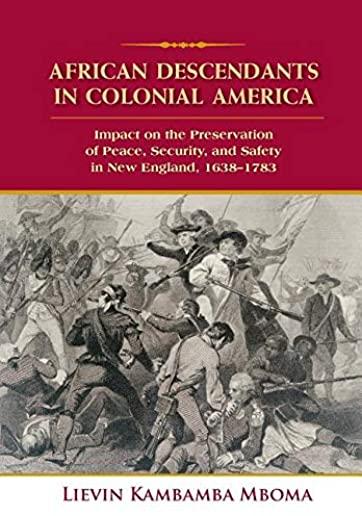
Mboma, Lievin Kambamba
African Descendants in Colonial America: Impact on the Preservation of Peace, Security, and Safety in New England, 1638-1783 analyzes salient data on the contributions made by black men in the area of public safety in the New England colonies. Regarding public safety, black men served as militiamen, soldiers, sailors, and privateers during the long-lasting colonial wars-- King William, Queen Anne, King George, and the French and Indian Wars. With the assistance of librarians and archivits from various New England historical societies, Lievin Kambamba Mboma gathered authoritative information on militia and privateer duties performed by Africans and African Americans in cooperation with white military men during colonial conflicts. In addition to the documents from historical societies, Mboma consulted colonial journals and history books written by local authors during the 1700s and 1800s from multiple New England towns. In the sources consulted, unquestionable information concerning black soldiers was documented. These primary and secondary sources included men who were slaves, servants, and free. Moreover, Mboma collected authoritative acts and militia laws written and observed for the inclusion of Africans in the security apparatus of each New England colony, respectively--Massachusetts, Connecticut, Rhode Island, and New Hamphsire.
African Descendants in Colonial America also discusses the approach advocated by Sir William Pitt, First Earl of Chatham and the British Secretary of State during the French and Indian War. His determinaton to end French domination in North America was argued vehemently. In addition to the political and military designs of Sir William Pitt, the research tackles the impact made by British soldiers during the French and Indian Wars. Nearing the end of these wars, Sir William Pitt championed funding colonial militia to defeat the French in North America. Moreover, the impact made by friendly Native Americans in the execution of the colonial conflict is noted, and the annexation of Canada to the British crown is mentioned.
Mboma's work visualizes race relations in America from a fresh perspective. He discusses the multiple-status of Africans and African Americans in colonial America. They were slaves, servants, and freemen. During warfare, they fought side-by-side with their white counterparts. It appears that they were not discriminated against in the battle field. Men of African descent fought and defended freedom with the same purpose and passion as their white compatriots. Mboma's study demonstrates the significance of communal struggle for freedom and liberty. New England colonists utilized a temporary inclusive militia policy to end the domination of the French in North America. Similarly, during the American Revolution, African Americans were enlisted for the fight against the unjust policy of King George III of England. Deeds such as those of Cripus Attucks, Peter Salem, and Salem Poor notably show that Africans and their descendants were valuable military associates who contributed greatly in America's public safety and her fight for indedpendence. Mboma further examines multiple duties performed by men of color in the Continental Army and the navy during wartime at various locales in New England.
Importantly, African Descendants in Colonial America enlightens readers regarding the much overlooked limited freedom afforded Africans in New England during the early colonial years. Data shows that during this period black men were permitted to elect honorable persons among themselves to serve as governor and other elected officials. The black governor had executive and judicial power.







